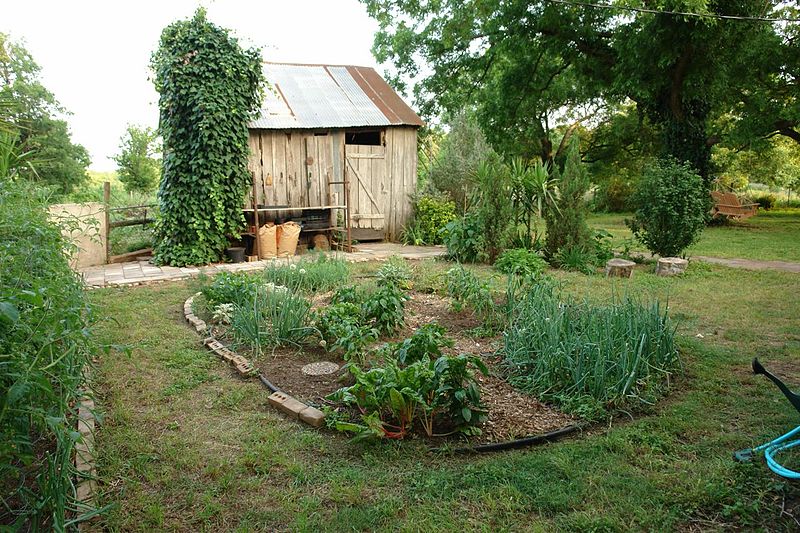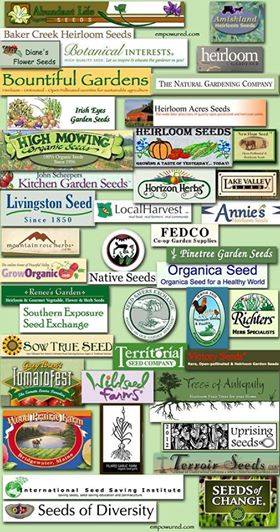Table of Contents[Hide][Show]

Seed catalogs for the upcoming growing season are arriving in mailboxes across the Northern Hemisphere with home growers everywhere starting to plan which seeds they will sow in freshly composted garden. A positive trend in recent years is the growing number of gardening enthusiasts choosing to plant gardens using organic and/or heirloom seeds.
What most of these home gardeners don’t realize is that corporate behemoth and GMO titan Monsanto has been gobbling up the seed market faster than a caterpillar can munch a tomato plant! With one fell swoop in 2005, Monsanto grabbed approximately 40% of the US vegetable seed market with its acquisition of Seminis.
This means that a home gardener could unknowingly be supporting the development and proliferation of genetically modified crops if the seeds used are from Seminis. In addition, Monsanto now apparently owns the trademark for many of the names of the heirloom seed varieties themselves!
Planting a sustainable home garden is much more than just choosing certified organic seeds and seedlings, eschewing pesticides/herbicides and using organic compost. This is because Monsanto has cleverly positioned itself to make money off the home gardening trend.
Does this mean that even if you buy organic or heirloom seeds from a completely independent company some of your purchase might be supporting the bad guys?
Yes, it does.
Surprise!
Home gardeners would do well to bone up on where to purchase their seeds so they aren’t inadvertently doing business with companies that maintain a working relationship with Monsanto-Seminis or were acquired by them.
Buying Organic or Heirloom Seeds Without Supporting Monsanto
Here are the recommended steps for the 2014 growing season for those who want to truly strike a blow for sustainability in every way with their home gardens:

Avoid buying from the seed companies affiliated with Monsanto. Here’s a list of these seed companies by location (enter you zipcode for a list of dealers to avoid).
- Buy from companies Monsanto HASN’T bought and are not affiliated or do business with Seminis: The graphic above indicates numerous companies that are worthy of your patronage as compiled by the International Seed Saving Institute. Please note that this many not be a complete list. If your seed company does not appear, just be sure to clarify with the owner about any potential affiliation with Monsanto-Seminis before buying from them.
- Avoid buying heirloom varieties for which Monsanto owns the trademark.
- Ask seed companies if they have taken the Safe Seed Pledge. Here’s a list of companies that have taken the Safe Seed Pledge and believe in responsible plant genetics. These are good companies to buy from.
Background on Monsanto’s Quest for World Seed Domination
Monsanto’s corporate quest is clearly to make money on each and every one of us whether we choose to eat supermarket frankenfoods produced with abominable, patented GM crops or carefully plant and tend an organic garden at home. Here’s some background information on the subject you may find interesting as well as enlightening:
If you are a home gardener and have information to contribute regarding these steps, please add to the discussion in the comments section. Also, please spread the word via gardening forums you may participate in that folks need to be very careful when seed sourcing for their spring gardens this year else they might be unknowingly supporting Monsanto.
Let’s make this the year when Monsanto’s grip on the worldwide seed market loosens and the movement to seed sustainability gains momentum!
Update
The day after this article was originally published in 2013, the CEO of a large GMO soybean seed company in the Midwest emailed me complaining that the article was short-sighted and insisting that Monsanto is helping feed the starving people of the world. He even went so far as to say that GMO crops are “proven safe”. Click here for the text of this CEO’s entire email plus my written reply.
I have also received email complaints from two other seed companies, one in Canada and one in Arkansas, that do business with Monsanto-Seminis and were offended by what they viewed as inaccuracies in the post. In response, I have adjusted the text slightly and moved linked sources to within the text rather than only listed at the end to make the message of the post as clear and precise as possible so as to not result in any consumer confusion over the information.
I have received no complaints about this article from seed companies completely independent of any affiliation or ties to Monsanto-Seminis.
More Information
Why I Avoid Organic Hydroponic Produce
The Hydroponic Invasion of USDA Organic
Heirloom vs Hybrid Produce
Photography Credit








I watched Food, Inc. awhile ago and was really shocked by some of the things I learned from that documentary. Thanks for the post.
I have bought some seeds from Sow True Seeds, but I am going to look into Baker Creek. As for Burpee, they claim that they have organic seeds, BUT they have refused to sign the Safe Seed Pledge. Something in the pit of my stomach tells me not to buy seeds from there. I read the book Seeds Of Destruction and it makes me sick to think that big corporations have that kind of control. It seems that our best option is to buy our seeds from proven Non-GMO companies and then harvest our own.
I think the important thing to remember here is SAVE YOUR OWN SEEDS!
There are some good old standbys on that list of seed names that Monsanto owns. (People seem to be getting the words “organic”, “heirloom”, and “GMO” mixed up here. These are all different concepts. The varieties on that list are NOT GMO’s just because Monsanto owns the names).
If you like those varieties, then by all means grow them, but SAVE YOUR OWN SEEDS from them. That way, you can keep the variety alive (if everyone stops growing a variety of plant, it goes extinct), but Monsanto won’t be getting any money off it.
Then, after you save your own seeds, give away or trade the extra seeds to other gardeners who want the variety, so those other gardeners don’t have to buy the variety from Monsanto.
There are some good resources out there on how to save your own seed. Get the book Seed to Seed by Suzanne Ashworth and Breed Your Own Vegetable Varieties by Carol Deppe. How easy it is to save seed depends on the species of plant. Some are very easy to save, like tomatoes. Other things, like carrots, are a bit more of a hassle. But seed saving is fun and it makes you have TOTAL CONTROL over your garden plants, from generation to generation.
Might be a good idea to start a seed exchange with gardeners in your area. Save out your seed from year to year. Yes, maybe the first purchase goes to Mon-Satan, but after that – as long as they haven’t gene spliced in the *evil* Terminator Gene – you should be able to produce and share your own seeds.
Except with crops that have pollen that speeds far and wide. Corn, for example. You can’t save corn if others grow GM corn within a few miles because chances are, it will be GM contaminated. The only way to have truly non GMO corn (and some other crops) is to plant organic seeds each year. It is just plain wring that this burden is placed on those wishing to grow or eat non GMOs.
Very informative post Sarah. For those who purchase their small garden plants from a local nursery or farmer, we also need to remember to ask our local gardeners and farmers where they buy their seeds and encourage them to use non GMO seeds, as well.
Once again, thank you for keeping important issues in front of our eyes. Easy to get caught up in day to day work and forget some of the very important things. With spring around the corner and another garden season to start….. THIS IS VERY IMPORTANT!!!!! Now is the time to start planning and ordering seeds responsibly, not waiting until planting date and then running to the local garden shop to pick up your seedlings and seeds.
I think your comments are misleading. You state, “Does this mean that even if you buy organic or heirloom seeds from a completely independent company but Monsanto owns the name of that seed, some of your purchase is going into the pockets of the bad guys?Yes, it does.”
The article you reference states, “Monsanto will only profit from customers purchasing these varieties from companies that are stocking seeds obtained directly from Monsanto or one of its distributors.” Other sources concur with this. While I’m all for NOT supporting Monsanto, you CAN still buy the listed varieties from a trusted source who does not obtain the seeds from Monsanto or one of its distributors. It all goes back to knowing your source.
Monsanto/Seminis will only profit when you buy those seeds directly purchased from them or companies who purchase from them.
So, if you buy seed from Baker Creek that has the same type of heirloom seed as a name that Monsanto/Seminis own, they will not be getting a check from Baker Creek. And most other heirloom companies out there also have their own stock of seed that has nothing to do with Monsanto. Just check with the company you are doing business with if you are not sure where the seed came from, they will be more than happy to tell you.
Thank you so much for sharing this information!!!!!!
I asked her about Monday Mania, too. She said you have to go to Pinterest to see it now. I’m not crazy about that.